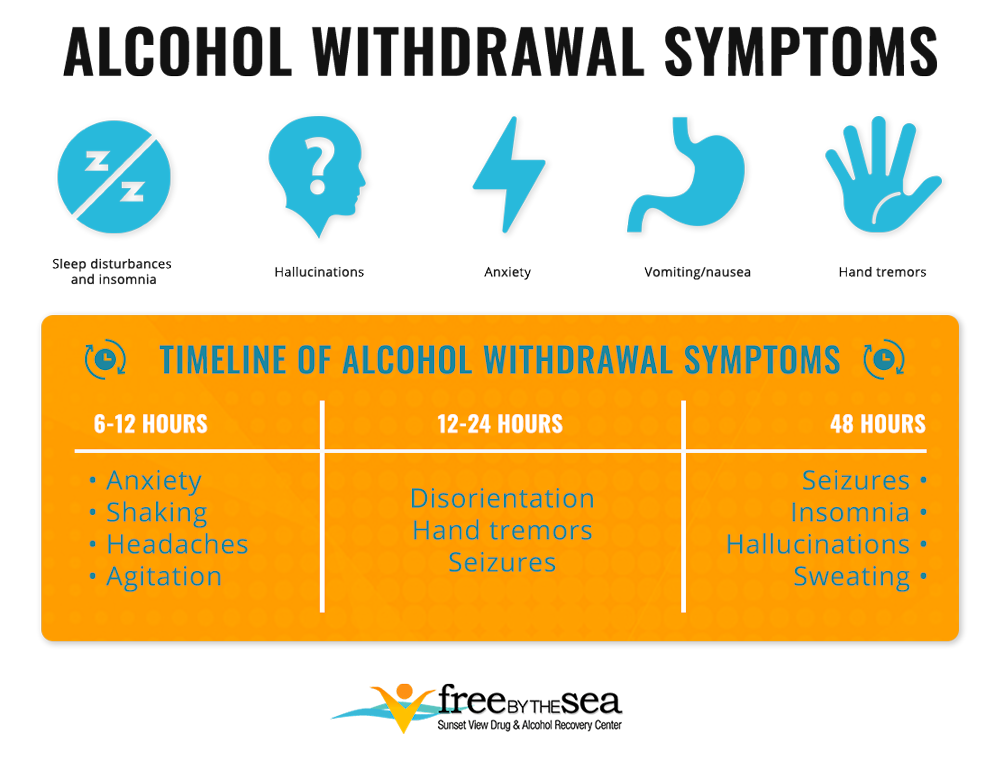Just as no two addictions are identical, also no two withdrawals are the same. Some individuals who abuse alcohol may find themselves able to quit drinking with no major side effects, while others might face life-threatening medical problems. In most situations, the longer a person drinks, and the more severe their addiction is, the more likely they are to experience severe side effects.
If you’ve recently stopped drinking and feel as if you are experiencing withdrawal symptoms, Free by the Sea can help you with essential rehabilitation services.
We are serving the Nation, based in the Pacific Northwest.
Recognizing Alcohol Addiction
Recognizing alcohol addiction in you or a loved one’s life is the first step. Being honest and self-aware about where you’re at is key to making the right steps towards finding a solution. Fortunately, there are tell-tale signs of alcohol addiction that one can look out for. Although every individual is different, there are certain signs that most alcohol-dependent individuals show.
Substance abuse experts typically differentiate alcohol abuse from alcoholism. Alcoholism is considered to be a more severe form of alcohol abuse. However, both diseases show similar symptoms and struggles. Unlike alcoholics, alcohol abusers have some ability to set limits on their drinking. Regardless of the specific disease, alcohol use can lead to self-destructive habits and chaos in one’s life. Some symptoms one can generally lookout for include:
- Consistently neglecting your obligations at home, work, or school because of your drinking. The consequences of neglecting these obligations include doing poorly in school, losing people you love, and having problems at work.
- Using alcohol in situations where it’s physically dangerous, such as drinking and driving, or mixing alcohol with other drugs.
- Drinking to relieve stress and pain. Instead of coping with stress healthily, you find yourself looking for a quick fix to feel temporarily better.
- You no longer feel like you’re in control of your drinking habits. You often drink more alcohol than you wanted to, for longer than you planned on, or despite telling yourself, you wouldn’t.
- You attempt to quit drinking, but feel unable to stop. No matter how much you seem to try, the temptation and desire to drink seems to win.
- Alcohol has become a priority in your life. You spend a lot of time drinking, thinking about it, or recovering from the effects of alcohol. You tend to participate in activities that revolve around drinking.
- You drink despite negative consequences. For instance, you recognize that your alcohol use is damaging the relationships in your life and causing issues in your health, but you continue to drink anyway.
What Is Alcohol Withdrawal?

After consuming large amounts of alcohol for a long period, the body will go into a state of shock when there is no alcohol in one’s system. As more and more alcohol is consumed, a person will begin to build a tolerance to the chemicals. This consequently causes them to become dependent on alcohol to function normally. The withdrawal symptoms are the result of the nervous system attempting to compensate for the lack of alcohol.
Alcohol Withdrawal Symptoms To Watch Out For
Anyone who is physically addicted to alcohol will generally show signs of withdrawal around six to 24 hours after their last drink. These symptoms can last for seven to ten days.
Alcohol withdrawal symptoms may include the following:
- Hand tremors
- Nausea
- Anxiety
- Vomiting
- Insomnia
- Hallucinations
- Seizures
- Autonomic instability
The longer the person has been abusing alcohol, the stronger these withdrawal symptoms will become. Everyone needs to remember that there are no two withdrawals that will be alike. Many factors influence how a recovering individual will experience alcohol withdrawal symptoms. Everything from one’s genetics to previous attempts at detoxing will affect how violent the side effects will be.
For the most severe addictions, withdrawal symptoms may manifest themselves in as little as two hours and could be life-threatening. These are just some of the reasons that medical professionals must be nearby throughout this period.
Alcohol Withdrawal Symptoms Day By Day
While residing at our recovery center, we’ll be able to monitor and take care of your withdrawal symptoms. It’s crucial to have a trained medical staff looking after you during the alcohol withdrawal process. Symptoms range in severity as the days go on. Alcohol withdrawal symptoms generally follow this timeline:
Six to 12 hours post-ingestion
- Agitation
- Anxiety
- Headaches
- Shaking
- Nausea and vomiting
12 to 24 hours post-ingestion
- Disorientation
- Hand tremors
- Seizures
48 hours post-ingestion
- Seizures
- Insomnia
- High blood pressure
- Tactile, auditory, and visual hallucinations
- High fever and excessive sweating
- Delirium tremens
Alcohol Withdrawal Treatment

Detox is the first step of most treatment plans for alcohol addiction. It’s a crucial foundation that allows the rest of the treatment to take place. The goal of detoxification is to rid your body of toxins accumulated through substance use.
The type of detox program or level of intensity needed for effective alcohol withdrawal management will depend upon the unique recovering individual. Our dedicated medical staff will do an in-depth evaluation before you enroll in treatment. This evaluation will help us understand what stage of addiction you’re in.
Moving forward, we’ll ensure that your recovery process is as smooth as possible. There are varying levels of care offered, depending on the individual’s needs. Keep reading to learn more about some of the methods of treatment used for alcohol withdrawal symptoms.
Medically-Assisted Detox
During detoxification, alcohol is completely flushed from your body. Withdrawal symptoms generally begin to alleviate within approximately one to two weeks after starting detox. It may take more or less time for alcohol withdrawal symptoms to subside depending on the severity of the addiction.
When alcohol withdrawal symptoms are treated in an inpatient rehabilitation facility, different medications may be used to alleviate uncomfortable alcohol withdrawal symptoms. Medications may also be used to keep a recovering individual’s body chemicals in balance. Thus, lowering the risk of serious medical complications.
Outpatient Treatment for Alcohol Withdrawal
Outpatient rehabilitation for alcohol withdrawal symptoms is ideal for those who wish to reside in their communities during treatment. Recovering individuals will have the opportunity to create a schedule that best suits their unique needs. If you’re an individual with serious responsibilities such as taking care of a child or attending work, outpatient rehabilitation allows you to do so.
In this kind of program, members of our recovery center will travel to the facility for treatment. Treatment is tailored to each individual. However, the core component of our treatment plans consists of evidence-based methods such as cognitive-behavioral therapy and support groups, which are central to our outpatient rehab programs.
Outpatient rehabilitation also allows you to save quite a bit of money. An outpatient program is less costly because it doesn’t include the fees associated with boarding. Overall, outpatient rehabilitation is an excellent option for those looking to overcome alcohol addiction and withdrawal symptoms.
Inpatient Treatment for Alcohol Withdrawal
Residential treatment also referred to as inpatient rehabilitation, offers the highest level of care at our recovery center. The length of this program varies based on the recovering individual. However, most treatment plans last anywhere from 28-day to 90-day periods.
Inpatient treatment requires the person to reside at our facility with full access to all amenities. As a member of residential treatment, you’ll receive full access to all of our amenities and treatment services. Aside from access to a living space and gym, you’ll also receive 24/7 medical and psychological support.
Each day will have a structured routine with time set aside for different forms of therapy, group sessions, and much more. Each treatment plan is personalized depending on the severity of the alcohol addiction and withdrawal symptoms. Inpatient rehabilitation gives recovering individuals the opportunity to fully focus on self-care and recovery.
Partial Hospitalization Programs for Alcohol Withdrawal
Partial hospitalization programs (PHPs), also known as day programs, provide intensive treatment for alcohol addiction and withdrawal symptoms. Although they provide a high level of care, recovering individuals do not need to reside at our recovery center. You’ll travel to our center for treatment with the ability to return home after.
A recovering individual in a PHP will visit our recovery center for several hours each day, three to five days per week. It’s worth reiterating that each treatment is personalized, so the exact schedule will vary. Partial hospitalization is also a method of step-down treatment. After finishing a more intensive level of care, many individuals choose to partake in a PHP to decrease the chances of a relapse.
Evidence-based therapies, group counseling, and medical support are all key components of a partial hospitalization program at our facility. We encourage you to reach out to us about any questions you may have about the varying levels of care, as well as where you would fit best.
Why Choose Free by the Sea?

Free by the Sea is a recovery center with many amenities, as well as a beautiful facility for individuals seeking help with addiction recovery. We believe that each member of our recovery center has the potential to not only overcome addiction but leave treatment with an enormous sense of fulfillment.
Our goal is to provide tools that’ll help you develop healthy coping mechanisms long after you finish treatment. Our services range from holistic care and evidence-based therapy to an emphasis on exercise and overall well-being. Some of these services include:
- Licensed Substance Abuse Counselors
- High-quality evidence-based addiction treatment, including gambling.
- DBT, CBT, EMDR, and trauma-informed treatment addresses underlying roots of addiction, such as depression, anxiety, self-esteem, and relationships.
- Relapse Prevention, Life Skills, Addiction education provided in groups and individual sessions
- Residential, partial hospitalization, and intensive outpatient levels of care.
- Peaceful and safe setting located on five acres facing the Pacific Ocean.
- Multi-sport areas that include volleyball/basketball courts and an exercise room.
- Nutritionally designed meals to promote physical and mental health
Why Rehabilitation is Crucial in Conquering Alcohol Withdrawal Symptoms and Addiction
There are many benefits to attending a treatment program at a recovery center, such as Free by the Sea. Most importantly, attending rehabilitation while experiencing alcohol withdrawal symptoms allows the individual to be medically supervised during this uncomfortable time. Alcohol withdrawal symptoms can become quite severe if not addressed and worked through properly. Besides, rehabilitation provides an advantageous structure for recovering individuals. Treatment at a recovery center can make a major difference for a variety of different reasons. Five of these reasons include:
- A recovery center provides a very much-needed structure in a recovering individual’s life. In residential treatment, specifically, there is minimal free time. If you are working through an alcohol addiction and withdrawal symptoms, free time can be harmful. Our treatment programs are designed to keep you occupied so that you are less likely to give thought to your addiction.
- There’s a wide range of access to different kinds of evidence-based therapies. We offer therapies ranging from cognitive-behavioral therapy to dialectical-behavioral therapy to group sessions and recovery meetings.
- You have the opportunity to form life-long friendships with your peers that are on a similar journey to yours. At Free by the Sea, you’ll notice that you all share a common goal: Life-long sobriety and a deeper sense of fulfillment without the need for a substance.
- There is around-the-clock medical care and support. Recovering individuals can be confident in knowing that there is support and supervision 24/7 within residential treatment specifically. Mental withdrawal from alcohol can be an overwhelming aspect of recovery. 24/7 support can provide you with some significant relief.
- Recovery centers are drug and alcohol-free. The temptation is easier to deal with if you’re in a trigger and substance-free environment. Treatment allows you to focus on your recovery goals.
Call Free By the Sea Today and Overcome Alcohol Withdrawal Symptoms!
An addiction to alcohol will not only impact your own life, but it will also begin to hurt all those around you. When left untreated, an addiction will almost always win. At Free by the Sea, located in the State of Washington, our team is ready to help anyone who dares to finally take back control of their life after struggling with alcoholism.
The path to sobriety can be difficult, but those with an unparalleled support system will put themselves in the best position for living a substance-free life. Contact us today.

Dr. Richard Crabbe joined our team in 2019 as our psychiatrist and medical director. He attended the University of Ghana Medical School where he became a Medical Doctor in 1977. From 1978 through 1984, he was a medical officer in the Ghana Navy and provided a variety of services from general medicine to surgeries. He received his Certificate in General Psychology from the American Board of Psychology and Neurology in 2002.
Insurances We Accept
Free by the Sea recognizes the importance of having insurance to receive addiction treatment. Let us work with you to provide you or a loved one with premier addiction treatment services. We accept several private insurance plans. Verify your rehab coverage with us today to ensure you receive the support that you need! Find out if you are covered today!











